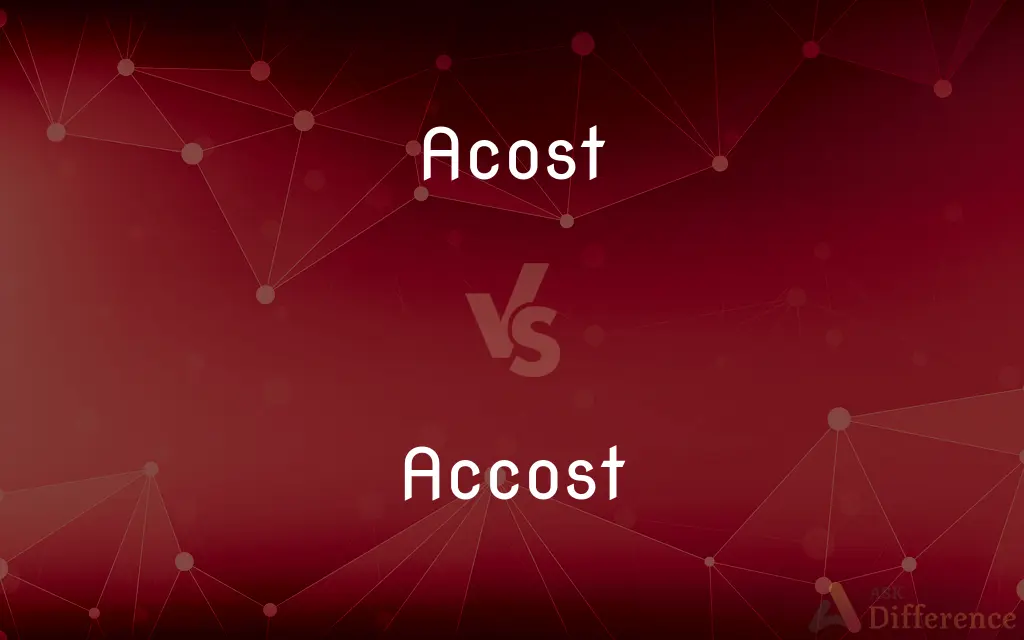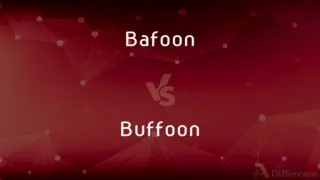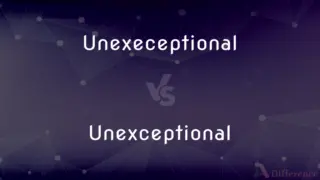Acost vs. Accost — Which is Correct Spelling?
By Tayyaba Rehman — Updated on March 27, 2024
"Acost" is an incorrect spelling, while "Accost" is the correct spelling, referring to approaching someone aggressively or confrontationally.

Table of Contents
Which is correct: Acost or Accost
How to spell Accost?

Acost
Incorrect Spelling

Accost
Correct Spelling
ADVERTISEMENT
Key Differences
Mentally break it into 'Ac'+'cost' to remember the double C.
"Accost" has two C's, like the word "approach," which is similar in meaning.
The extra 'c' stands for confrontation, indicating the confrontational nature of the approach.
Remember, the word is longer because the action is more intense.
Think of "cost" – you pay a cost when someone "accosts" you by approaching confrontationally.
ADVERTISEMENT
How Do You Spell Accost Correctly?
Incorrect: The man attempted to acost her with his sales pitch.
Correct: The man attempted to accost her with his sales pitch.
Incorrect: He tried to acost me in the street about signing the petition.
Correct: He tried to accost me in the street about signing the petition.
Accost Definitions
To confront someone with a demand or request
She accosted the manager with her complaint.
To approach and address someone boldly or aggressively
He was accosted by a stranger on the street.
To face or turn to something, especially of a ship's side
The ship's starboard side accosted the dock.
To initiate conversation with someone unexpectedly
Reporters accosted the celebrity as he left the restaurant.
To approach and speak to, especially aggressively or insistently, as with a demand or request.
To approach and speak to with the intent of having sex.
(transitive) To approach and speak to boldly or aggressively, as with a demand or request.
To join side to side; to border.
To sail along the coast or side of.
To approach; to come up to.
(transitive) To speak to first; to address; to greet.
To adjoin; to lie alongside.
(transitive) To assault.
(transitive) To solicit sexually.
(rare) Address; greeting.
An attack.
To join side to side; to border; hence, to sail along the coast or side of.
To approach; to make up to.
To speak to first; to address; to greet.
Address; greeting.
Speak to someone
Approach with an offer of sexual favors;
He was solicited by a prostitute
The young man was caught soliciting in the park
To approach someone with the intent of speaking
He accosted his long-lost friend at the reunion.
Accost Meaning in a Sentence
A friendly dog accost me during my morning walk, wagging its tail.
As soon as she stepped out of the taxi, vendors accost her with offers.
Accost Idioms & Phrases
Accost with questions
To approach someone and immediately begin asking them questions.
The teacher was accosted with questions by curious students after the lecture.
Accost by surprise
To approach or confront someone unexpectedly.
She was accosted by surprise when her proposal was accepted without any objections.
Accost with a cause
To approach someone with the intention of persuading them to support a cause or campaign.
Environmental activists accosted shoppers with a cause, encouraging them to sign a petition against plastic bags.
Accost with open arms
To greet or approach someone very warmly and friendly.
After years apart, the old friends accosted each other with open arms.
Accost on all sides
To be approached or confronted by many challenges or people simultaneously.
As soon as he became famous, he was accosted on all sides by requests for interviews and appearances.
Accost at the doorstep
To confront or approach someone as soon as they are about to enter or leave a place.
The detective was accosted at the doorstep by reporters asking about the case.
Common Curiosities
What is the root word of Accost?
The root word is the Latin "accostare".
What is the pronunciation of Accost?
ə-KOST.
Which vowel is used before Accost?
The vowel "a" is used before "accost".
Why is it called Accost?
Derived from the Latin word "accostare" meaning "to bring side by side", it now means to confront or approach someone aggressively.
What is the verb form of Accost?
"Accost" is already in its verb form.
Which preposition is used with Accost?
"By" as in "accosted by a stranger".
Is Accost an adverb?
No.
Is Accost a negative or positive word?
Generally negative, due to its confrontational connotation.
What is the singular form of Accost?
Accost is both singular and verb form.
What is the plural form of Accost?
Being a verb, "accost" does not have a plural form.
Is the word Accost imperative?
It can be, e.g., "Accost him now!"
Which conjunction is used with Accost?
There isn't a specific conjunction exclusively used with "accost"; it depends on the sentence.
What is the first form of Accost?
Accost.
Is Accost a countable noun?
"Accost" is a verb, not a noun.
Is the word Accost a Gerund?
No, but "accosting" is the gerund form.
How do we divide Accost into syllables?
Ac-cost.
What part of speech is Accost?
Verb.
Is Accost a vowel or consonant?
"Accost" is a word, not a single letter. However, it starts with a vowel.
Is Accost a collective noun?
No.
What is a stressed syllable in Accost?
The second syllable, "cost", is stressed.
What is the opposite of Accost?
Avoid or shun.
Which determiner is used with Accost?
Depends on the sentence; there's no specific determiner that's exclusively used with "accost".
What is the second form of Accost?
Accosted.
Which article is used with Accost?
Typically "an" as in "an accosting demeanor", but depends on the context.
Is Accost an abstract noun?
No.
What is another term for Accost?
Confront.
Is Accost a noun or adjective?
"Accost" is primarily a verb.
Is the Accost term a metaphor?
No, but it can be used metaphorically in literature.
Is the word “Accost” a Direct object or an Indirect object?
"Accost" is a verb. It can have direct and indirect objects following it, depending on sentence structure.
How many syllables are in Accost?
Two.
What is the third form of Accost?
Accosted.
Share Your Discovery

Previous Comparison
Bafoon vs. Buffoon
Next Comparison
Unexeceptional vs. UnexceptionalAuthor Spotlight
Written by
Tayyaba RehmanTayyaba Rehman is a distinguished writer, currently serving as a primary contributor to askdifference.com. As a researcher in semantics and etymology, Tayyaba's passion for the complexity of languages and their distinctions has found a perfect home on the platform. Tayyaba delves into the intricacies of language, distinguishing between commonly confused words and phrases, thereby providing clarity for readers worldwide.


































